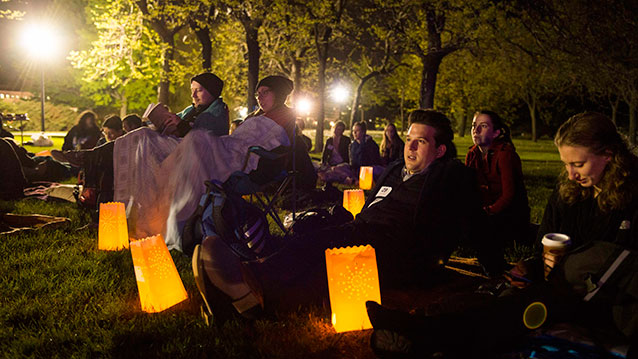EVANSTON, Ill. --- As lakefront temperatures dipped into the low 40s, Northwestern’s first Homerathon – a marathon reading by Northwestern faculty and students of Homer’s Iliad – was not an event for the faint-of-heart.
“The Iliad by Moonlight” began just past 10 p.m. Friday (May 23) and continued until Katie Hartsock, a Northwestern doctoral candidate in comparative literary studies, read the final passage of Homer’s great work shortly before the sun began to rise above Lake Michigan early Saturday morning.
“Greek epic poetry was meant to be read aloud, and the ancients recited it in public spaces,” said Francesca Tataranni, Northwestern’s Latin program director and Homerathon organizer. With help from her students, she edited Homer’s Iliad, one of poetry’s most enduring works.
“It was a magical experience that only a participant could fully understand,” said sophomore Tyler Bolden, a history major and classics minor. “Reading the poem on one’s own and reciting it aloud in public are two very different things.”
Bolden, at 4 a.m., recited the words of the great god Zeus in the voice of Don Corleone of Marlon Brando’s “Godfather” fame. “People come to Zeus for favors in much the way that people came to the Godfather for favors,” graduate student Hartsock explained. “Reading Zeus’ words in the voice of Corleone didn’t simply add a bit of levity to a long event, it also made a certain kind of sense.”
Attendance at the marathon reading capped between 1 and 2 a.m. when close to 100 people gathered around the fire pit at Northwestern’s lakefill. The luckiest participants, wearing hats, thick socks and mittens and wrapped in blankets and sleeping bags, stayed hours later when meteor showers occurred.
“The shooting stars were a sign that the Olympian gods favored our undertaking,” Tataranni surmised.
Hartsock, the last reader, left the podium at 5:07 a.m., a quarter-hour before sunrise. According to Tataranni, the moments that followed were “the most magical” of what was already an awe-inspiring night. That’s when 25 brave individuals defied the cold temperatures and stared in silence at the horizon after seven hours of nonstop reading.
“Spending a night with Homer, the blind poet, taught us to look at our human condition with new eyes,” Tataranni said. “When the sun rose at 5:22, we served bagels, cream cheese and orange juice. As Achilles says to Priam in the Iliad’s final reconciliation scene: ‘So come – we, too, old king, must think of food.’”
And so, with body and soul fulfilled, “The Iliad by Moonlight” came to an auspicious and nourishing end.


